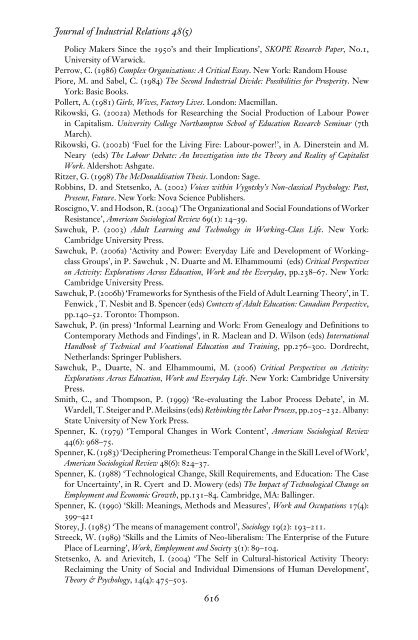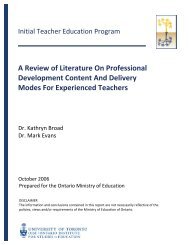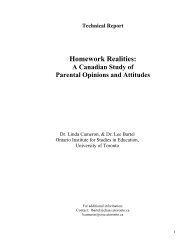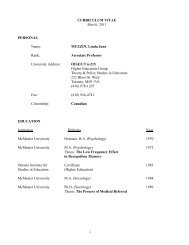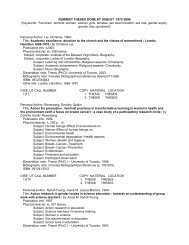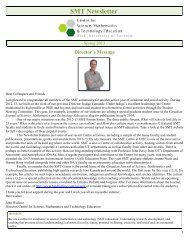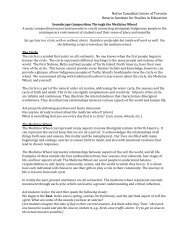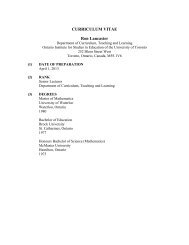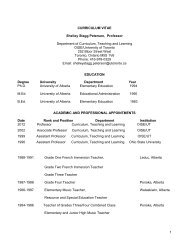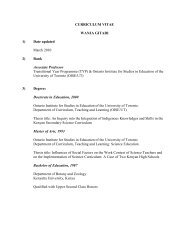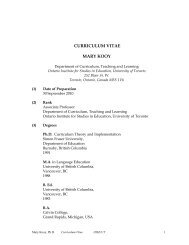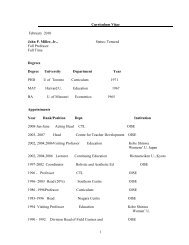'Use-Value' and the Re-thinking of Skills, Learning and the Labour ...
'Use-Value' and the Re-thinking of Skills, Learning and the Labour ...
'Use-Value' and the Re-thinking of Skills, Learning and the Labour ...
Create successful ePaper yourself
Turn your PDF publications into a flip-book with our unique Google optimized e-Paper software.
Journal <strong>of</strong> Industrial <strong>Re</strong>lations 48(5)Policy Makers Since <strong>the</strong> 1950’s <strong>and</strong> <strong>the</strong>ir Implications’, SKOPE <strong>Re</strong>search Paper, No.1,University <strong>of</strong> Warwick.Perrow, C. (1986) Complex Organizations: A Critical Essay. New York: R<strong>and</strong>om HousePiore, M. <strong>and</strong> Sabel, C. (1984) The Second Industrial Divide: Possibilities for Prosperity. NewYork: Basic Books.Pollert, A. (1981) Girls, Wives, Factory Lives. London: Macmillan.Rikowski, G. (2002a) Methods for <strong>Re</strong>searching <strong>the</strong> Social Production <strong>of</strong> <strong>Labour</strong> Powerin Capitalism. University College Northampton School <strong>of</strong> Education <strong>Re</strong>search Seminar (7thMarch).Rikowski, G. (2002b) ‘Fuel for <strong>the</strong> Living Fire: <strong>Labour</strong>-power!’, in A. Dinerstein <strong>and</strong> M.Neary (eds) The <strong>Labour</strong> Debate: An Investigation into <strong>the</strong> Theory <strong>and</strong> <strong>Re</strong>ality <strong>of</strong> CapitalistWork. Aldershot: Ashgate.Ritzer, G. (1998) The McDonaldisation Thesis. London: Sage.Robbins, D. <strong>and</strong> Stetsenko, A. (2002) Voices within Vygotsky’s Non-classical Psychology: Past,Present, Future. New York: Nova Science Publishers.Roscigno, V. <strong>and</strong> Hodson, R. (2004) ‘The Organizational <strong>and</strong> Social Foundations <strong>of</strong> Worker<strong>Re</strong>sistance’, American Sociological <strong>Re</strong>view 69(1): 14–39.Sawchuk, P. (2003) Adult <strong>Learning</strong> <strong>and</strong> Technology in Working-Class Life. New York:Cambridge University Press.Sawchuk, P. (2006a) ‘Activity <strong>and</strong> Power: Everyday Life <strong>and</strong> Development <strong>of</strong> WorkingclassGroups’, in P. Sawchuk , N. Duarte <strong>and</strong> M. Elhammoumi (eds) Critical Perspectiveson Activity: Explorations Across Education, Work <strong>and</strong> <strong>the</strong> Everyday, pp.238–67. New York:Cambridge University Press.Sawchuk, P. (2006b) ‘Frameworks for Syn<strong>the</strong>sis <strong>of</strong> <strong>the</strong> Field <strong>of</strong> Adult <strong>Learning</strong> Theory’, in T.Fenwick , T. Nesbit <strong>and</strong> B. Spencer (eds) Contexts <strong>of</strong> Adult Education: Canadian Perspective,pp.140–52. Toronto: Thompson.Sawchuk, P. (in press) ‘Informal <strong>Learning</strong> <strong>and</strong> Work: From Genealogy <strong>and</strong> Definitions toContemporary Methods <strong>and</strong> Findings’, in R. Maclean <strong>and</strong> D. Wilson (eds) InternationalH<strong>and</strong>book <strong>of</strong> Technical <strong>and</strong> Vocational Education <strong>and</strong> Training, pp.276–300. Dordrecht,Ne<strong>the</strong>rl<strong>and</strong>s: Springer Publishers.Sawchuk, P., Duarte, N. <strong>and</strong> Elhammoumi, M. (2006) Critical Perspectives on Activity:Explorations Across Education, Work <strong>and</strong> Everyday Life. New York: Cambridge UniversityPress.Smith, C., <strong>and</strong> Thompson, P. (1999) ‘<strong>Re</strong>-evaluating <strong>the</strong> Labor Process Debate’, in M.Wardell, T. Steiger <strong>and</strong> P. Meiksins (eds) <strong>Re</strong><strong>thinking</strong> <strong>the</strong> Labor Process, pp.205–232. Albany:State University <strong>of</strong> New York Press.Spenner, K. (1979) ‘Temporal Changes in Work Content’, American Sociological <strong>Re</strong>view44(6): 968–75.Spenner, K. (1983) ‘Deciphering Prome<strong>the</strong>us: Temporal Change in <strong>the</strong> Skill Level <strong>of</strong> Work’,American Sociological <strong>Re</strong>view 48(6): 824–37.Spenner, K. (1988) ‘Technological Change, Skill <strong>Re</strong>quirements, <strong>and</strong> Education: The Casefor Uncertainty’, in R. Cyert <strong>and</strong> D. Mowery (eds) The Impact <strong>of</strong> Technological Change onEmployment <strong>and</strong> Economic Growth, pp.131–84. Cambridge, MA: Ballinger.Spenner, K. (1990) ‘Skill: Meanings, Methods <strong>and</strong> Measures’, Work <strong>and</strong> Occupations 17(4):399–421Storey, J. (1985) ‘The means <strong>of</strong> management control’, Sociology 19(2): 193–211.Streeck, W. (1989) ‘<strong>Skills</strong> <strong>and</strong> <strong>the</strong> Limits <strong>of</strong> Neo-liberalism: The Enterprise <strong>of</strong> <strong>the</strong> FuturePlace <strong>of</strong> <strong>Learning</strong>’, Work, Employment <strong>and</strong> Society 3(1): 89–104.Stetsenko, A. <strong>and</strong> Arievitch, I. (2004) ‘The Self in Cultural-historical Activity Theory:<strong>Re</strong>claiming <strong>the</strong> Unity <strong>of</strong> Social <strong>and</strong> Individual Dimensions <strong>of</strong> Human Development’,Theory & Psychology, 14(4): 475–503.616


